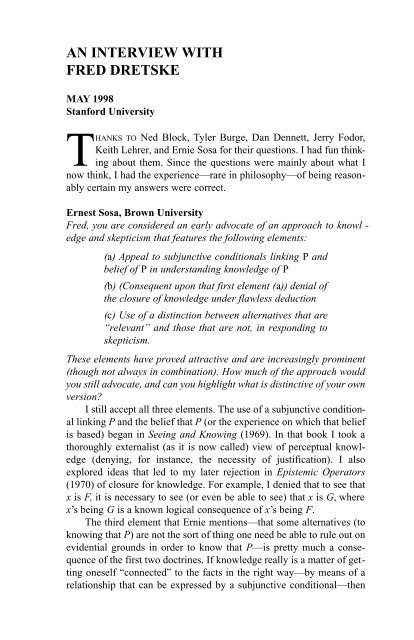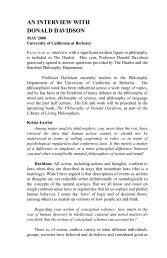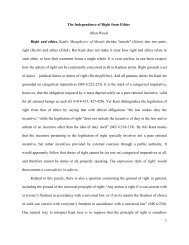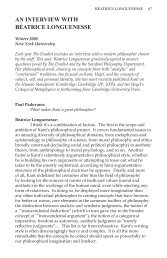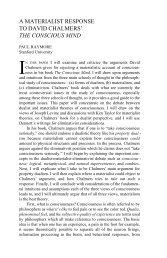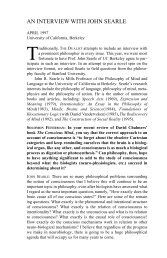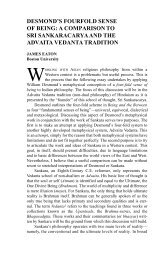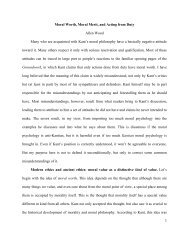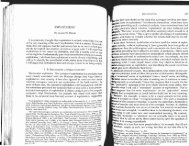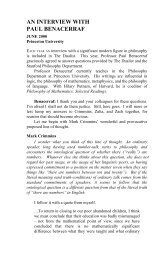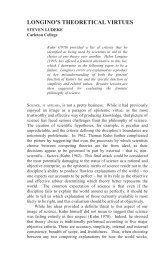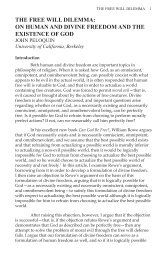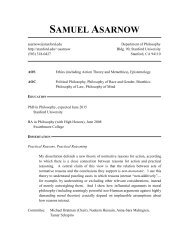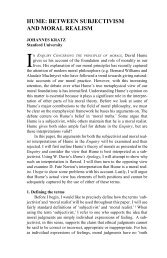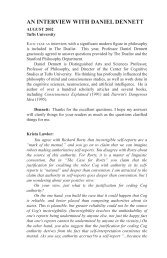An Interview with Fred Dretske - Stanford University Department of ...
An Interview with Fred Dretske - Stanford University Department of ...
An Interview with Fred Dretske - Stanford University Department of ...
You also want an ePaper? Increase the reach of your titles
YUMPU automatically turns print PDFs into web optimized ePapers that Google loves.
AN INTERVIEW WITH<br />
FRED DRETSKE<br />
MAY 1998<br />
<strong>Stanford</strong> <strong>University</strong><br />
THANKS TO Ned Block, Tyler Burge, Dan Dennett, Jerry Fodor,<br />
Keith Lehrer, and Ernie Sosa for their questions. I had fun thinking<br />
about them. Since the questions were mainly about what I<br />
now think, I had the experience—rare in philosophy—<strong>of</strong> being reasonably<br />
certain my answers were correct.<br />
Ernest Sosa, Brown <strong>University</strong><br />
<strong>Fred</strong>, you are considered an early advocate <strong>of</strong> an approach to knowl -<br />
edge and skepticism that features the following elements:<br />
(a) Appeal to subjunctive conditionals linking P and<br />
belief <strong>of</strong> P in understanding knowledge <strong>of</strong> P<br />
(b) (Consequent upon that first element (a)) denial <strong>of</strong><br />
the closure <strong>of</strong> knowledge under flawless deduction<br />
(c) Use <strong>of</strong> a distinction between alternatives that are<br />
“relevant” and those that are not, in responding to<br />
skepticism.<br />
These elements have proved attractive and are increasingly prominent<br />
(though not always in combination). How much <strong>of</strong> the approach would<br />
you still advocate, and can you highlight what is distinctive <strong>of</strong> your own<br />
version<br />
I still accept all three elements. The use <strong>of</strong> a subjunctive conditional<br />
linking P and the belief that P (or the experience on which that belief<br />
is based) began in Seeing and Knowing (1969). In that book I took a<br />
thoroughly externalist (as it is now called) view <strong>of</strong> perceptual knowledge<br />
(denying, for instance, the necessity <strong>of</strong> justification). I also<br />
explored ideas that led to my later rejection in Epistemic Operators<br />
(1970) <strong>of</strong> closure for knowledge. For example, I denied that to see that<br />
x is F, it is necessary to see (or even be able to see) that x is G, where<br />
x’s being G is a known logical consequence <strong>of</strong> x’s being F.<br />
The third element that Ernie mentions—that some alternatives (to<br />
knowing that P) are not the sort <strong>of</strong> thing one need be able to rule out on<br />
evidential grounds in order to know that P—is pretty much a consequence<br />
<strong>of</strong> the first two doctrines. If knowledge really is a matter <strong>of</strong> getting<br />
oneself “connected” to the facts in the right way—by means <strong>of</strong> a<br />
relationship that can be expressed by a subjunctive conditional—then
2 FRED DRETSKE<br />
being connected to Q doesn’t follow from being connected to P even<br />
when P logically requires Q. Irrelevant (to knowing P) alternatives are<br />
just those to which one isn’t connected in being connected to P. So the<br />
pieces were all present in the 1969 book. What came later was a better<br />
understanding <strong>of</strong> how these pieces fit together.<br />
What is distinctive about my own approach Perhaps only the priority<br />
I give to perception. If we know anything about the world, then,<br />
surely, perception (seeing, hearing, smelling that x is F) is a way <strong>of</strong><br />
knowing. If this is so, then, since (I assume) perception is also an important<br />
source <strong>of</strong> knowledge for children and animals (if Rover can’t see<br />
that the stick landed here, not there, why does he run here, not there, to<br />
fetch it) one is driven (I believe) to externalism about knowledge. I<br />
think it is hard to formulate plausible internalist conditions on knowledge<br />
when they have to fit Rover knowing where the stick is.<br />
Ned Block, New York <strong>University</strong><br />
It appears that on your view, zombiehood is hereditary. Have I misin -<br />
terpreted you Suppose that George Steinbrenner’s grandparents were<br />
all swamp-people, people formed by chance from particles from a<br />
swamp. Unlikely, yes, but possible, also yes. <strong>An</strong>d suppose that no sig -<br />
nificant evolution was involved in the process by which Steinbrenner’s<br />
grandparents and parents met each other and produced their <strong>of</strong>fspring.<br />
On your theory, it would seem that Steinbrenner is therefore a zombie.<br />
Growing up in the Bronx playing stickball did not give his experiences<br />
any representational content. But when an outraged fan kicked him in<br />
the shins, did he not feel pain<br />
I don’t know whether many readers will understand Ned’s motivations<br />
for asking about the hereditariness <strong>of</strong> zombiehood. So let me<br />
supply a bit <strong>of</strong> background. I have a theory about the character <strong>of</strong><br />
mental states (the qualities that, in Tom Nagel’s phrase, define what it is<br />
like to be S) that makes these qualities depend on the history <strong>of</strong> S.<br />
Identical creatures <strong>with</strong> different histories can have different thoughts<br />
and experiences and, if the histories are different e n o u g h, one can have<br />
experiences while the other (a physically identical creature) lacks experiences<br />
entirely (i.e., is a zombie). All this sounds crazy to many (most)<br />
people. Ned’s question is his way <strong>of</strong> dramatizing how counterintuitive<br />
this doctrine is. Surely George feels pain when kicked in the shins.<br />
Let me begin by saying that I agree <strong>with</strong> Ned about one thing. T h i s<br />
is all terribly counterintuitive. But then most people—on first hearing it—<br />
also find the idea that physically identical creatures could have diff e r e n t<br />
b e l i e f s counterintuitive. Nonetheless, Putnam’s and Burg e ’s examples<br />
(involving Twin Earth) have convinced many <strong>of</strong> these people that<br />
thoughts, purposes, intentions, desires, and so on (propositional attitudes)
AN INTERVIEW 3<br />
do not supervene on the physical constitution <strong>of</strong> the agent. Despite the<br />
same present physical constitution, creatures <strong>with</strong> different causal histories<br />
could have different beliefs and desires. This being so, complaints<br />
about the counterintuitive character <strong>of</strong> a theory about phenomenal experience<br />
that makes i t depend on history sound to me a little hollow coming<br />
from theorists (I assume Ned is one <strong>of</strong> them) who adopt (externalist)<br />
theories about judgment. After all, some theorists (Dennett, Armstrong, et<br />
al.) conceive <strong>of</strong> experience as just a special form <strong>of</strong> (implicit, covert)<br />
judgment. Hence, if judgments do not supervene on the current physical<br />
constitution <strong>of</strong> the judger, neither do experiences.<br />
Ned has himself given examples that demonstrate to many people’s<br />
(certainly to my) satisfaction that functionalism doesn’t capture the qualitative<br />
aspects <strong>of</strong> experience. Functionally identical beings need not have<br />
the same kind <strong>of</strong> experience—indeed, one could be a zombie (having no<br />
experience at all) while the other did. So Ned is prepared to say that<br />
G e o rge Steinbrenner could have a functional duplicate who was not in<br />
pain—someone (looking just like Steinbrenner) hopping around crying<br />
in what seems like pain after being hit <strong>with</strong> a stick who was not really in<br />
pain. Frankly, I don’t see a lot <strong>of</strong> difference between this result and the<br />
consequences <strong>of</strong> my own theory that Ned finds objectionable.<br />
In answer to Ned’s questions about the heritability <strong>of</strong> zombiehood,<br />
I make two points. No, zombiehood is not necessarily heritable since<br />
(on this view <strong>of</strong> experience) the descendants <strong>of</strong> zombies might not be<br />
zombies. Their internal states could acquire indicator functions that<br />
make them representations. This, I assume, is what happened in the evolution<br />
<strong>of</strong> consciousness: we (conscious beings) had (remote) ancestors<br />
who were not conscious. In the example Ned gives, however, we are<br />
asked to assume no significant selection has occurred, and, thus, that<br />
nothing in George has a biological function that the corresponding<br />
organ or state did not have in his parents. In this case, <strong>of</strong> course, George<br />
is a zombie if his ancestors were.<br />
Jerry Fodor, Rutgers <strong>University</strong><br />
You have fixed more <strong>of</strong> my philosophical fractures than any <strong>of</strong> my other<br />
gurus, for which I am grateful forever. But there’s one thing I still don’t<br />
get, even after all these years. (I think it’s pretty much what Chomsky<br />
asked Skinner.) If the content <strong>of</strong> a thought is determined by its history,<br />
how can there ever be novel thoughts<br />
Jerry asks about the source <strong>of</strong> novelty. If history determines what<br />
we think (the content <strong>of</strong> thought), how can we have thoughts we’ve<br />
never had before. I think I’m going to give an answer to this question<br />
that is pretty dull. It is exactly what both Jerry and I (and maybe everyone<br />
else) already believes. I’ll give it anyway.
4 FRED DRETSKE<br />
What history determines are the concepts out <strong>of</strong> which beliefs are<br />
formed, not the beliefs themselves. What makes brain state b 1 mean cat,<br />
brain state b 2 mean milk, and brain state b 3 signify the relation x likes y<br />
is history. What makes b 1 , b 2 , and b 3 combine today in S’s head in a way<br />
that expresses the proposition that cats like milk (a thought S has never<br />
had before) isn’t determined by history (at least not the same history<br />
that gives the individual concepts their content), but factors about current<br />
psychology and/or stimulus conditions. If everything is determined,<br />
then S is determined to think that cats like milk and so, in this sense,<br />
nothing is really novel. It is all predictable. But the novelty <strong>of</strong> thought—<br />
even in a deterministic world—arises from the fact that the (historical)<br />
conditions that give the elements <strong>of</strong> thought their meaning do not themselves<br />
determine which arrangements <strong>of</strong> those elements (the thoughts)<br />
will subsequently occur.<br />
Keith Lehrer, <strong>University</strong> <strong>of</strong> Arizona<br />
The account that you <strong>of</strong>fer <strong>of</strong> perceptual knowledge and the content <strong>of</strong><br />
belief is an exceptional achievement, but it leaves one wondering how<br />
to extend the account to theoretical knowledge and the content <strong>of</strong> beliefs<br />
about theoretical entities—that is, ones that one cannot perceive.<br />
There are really two questions that Keith is asking—one about<br />
knowledge:<br />
(1) How do I extend my account <strong>of</strong> perceptual knowledge<br />
to theoretical knowledge<br />
<strong>An</strong>d the other is about the content <strong>of</strong> belief:<br />
(2) Given my account <strong>of</strong> how we acquire the concept<br />
cow and tree (things we can perceive), how do I<br />
extend this to acquiring concepts for things we cannot<br />
perceive—e.g., bacterium or neutrino<br />
I don’t think I need extend the account <strong>of</strong> perceptual knowledge to the<br />
domain <strong>of</strong> theoretical knowledge since the account <strong>of</strong> knowledge is the<br />
same in both cases: we know that P when we are caused to believe that<br />
P by the information that P. Sometimes (as <strong>with</strong> cows) the objects we<br />
come to know about are visible (audible, etc.); in other cases (bacteria)<br />
they aren’t. In the latter case, instruments (microscopes, etc.) are needed.<br />
The seeing, hearing, etc. is indirect. But whether the information is<br />
delivered directly or indirectly, the knowledge is the same: information<br />
caused belief.<br />
The answer to the second question is harder. I don’t really know the<br />
answer. When asked this question I typically give the usual empiricist<br />
reply accompanied by a lot <strong>of</strong> hand-waving. Concepts for non-percep-
AN INTERVIEW 5<br />
tual objects are (somehow!) manufactured out <strong>of</strong> the observational concepts<br />
we already have plus whatever syntactical machinery is available<br />
(don’t ask me where this comes from) to combine concepts in various<br />
ways. I develop the concept <strong>of</strong> object too small to be seen (which<br />
applies to objects I cannot see) out <strong>of</strong> concepts like object, small, seen,<br />
etc.—concepts that apply to objects I can see.<br />
Dan Dennett, Tufts <strong>University</strong><br />
In “Differences that Make No Difference” (Philosophical Topics, 1994,<br />
the special issue on my work), you defend a version <strong>of</strong> non-epistemic<br />
seeing which, you noted, challenged my account in Consciousness<br />
Explained. I responded <strong>with</strong> a challenge <strong>of</strong> my own (same issue, “Get<br />
Real” in the section entitled “<strong>Dretske</strong>’s Blind Spot”), based on some <strong>of</strong><br />
the recent research on change blindness (which I had predicted in<br />
Consciousness Explained): your non-epistemic seeing is not interest -<br />
ingly different from what happens on the inert wall <strong>of</strong> an unoccupied<br />
camera obscura. You need to add some sort <strong>of</strong> uptake, I claimed, to jus -<br />
tify saying that details are “in consciousness” in the sense that they are<br />
not also on the wall in the camera obscura. Do you still think that there<br />
is a theoretically interesting sense <strong>of</strong> non-epistemic seeing that does not<br />
just collapse into something like “ephemeral cortical activity was the<br />
result <strong>of</strong> retinas being irradiated by light from” (or alternatively into<br />
something that is a non-ordinary variety <strong>of</strong> epistemic seeing after all)<br />
Dan Dennett’s and my disagreements (we also have many areas <strong>of</strong><br />
agreement) go back nearly thirty years, so we aren’t likely to settle them<br />
now. Each time we have a go at each other, I come away thinking I’ve<br />
finally put my point in such a convincing way that Dan will have to<br />
agree. Apparently he feels the same way about his ripostes. We keep<br />
disappointing each other.<br />
He asks whether I still think there is a theoretically interesting<br />
sense <strong>of</strong> non-epistemic seeing that doesn’t just collapse into ephemeral<br />
cortical activity (or some version <strong>of</strong> epistemic seeing). Well, yes I do,<br />
but a lot depends on what one finds “theoretically interesting.”<br />
Dan thinks the richness <strong>of</strong> the outside world, in all its ravishing<br />
detail, does not enter our experience <strong>of</strong> that world. I think a lot <strong>of</strong> this<br />
richness, this detail, does enter our experience. Not all <strong>of</strong> it, <strong>of</strong> course,<br />
but more <strong>of</strong> it than we notice or respond to. Maybe conditions can be<br />
arranged in which we would respond to (non-epistemically) perceived<br />
differences and qualities, but in most—perhaps all—casual encounters<br />
(think <strong>of</strong> glancing at a crowded room <strong>of</strong> people or a shelf full <strong>of</strong> books)<br />
we see more than we can know, more than it is possible to cognitively<br />
process. This is why I think a small child sees (exactly) five fingers<br />
before she knows how to count, before she knows the difference
6 FRED DRETSKE<br />
between five and four (or six). This is why I think seeing a Ø is so much<br />
different (subjectively speaking) from believing (judging, knowing) that<br />
there is a Ø.<br />
Dan is worried that my view makes the claim that S (non-epistemically)<br />
sees a Ø collapse into (something like) the claim that the Ø is visible.<br />
Not quite, but close. Given my bad eyesight, there are some visible<br />
things that I cannot see—even when I’m looking right at them. They<br />
are too small for me to see, but that doesn’t mean they are invisible.<br />
Others can see them.<br />
The results <strong>of</strong> the experiments Dan describes are absolutely neutral<br />
between his view and mine. The only way they can be interpreted as<br />
supporting Dan’s claim that S cannot see X unless there is some cognitive<br />
uptake (some identification or recognition <strong>of</strong> X) is if cognitive<br />
uptake is taken as criterial for seeing X. But this, <strong>of</strong> course, is exactly<br />
what—given our differences—he cannot do. I am, in fact, quite happy<br />
<strong>with</strong> the results <strong>of</strong> these experiments. They show what I would expect<br />
to be shown, what I take to be obvious—viz., that a lot <strong>of</strong> what we see<br />
we don’t notice. They do not show that we do not see things unless we<br />
notice them. They only show that if we see these things in a non-epistemic<br />
way (as I claim we probably do), epistemic seeing does not<br />
always accompany non-epistemic seeing. That, though, was my claim<br />
from the very beginning.<br />
Tyler Burge, UCLA<br />
Earlier in your career, you wrote a fine book entitled Seeing and<br />
Knowing. That book was primarily concerned <strong>with</strong> the epistemology <strong>of</strong><br />
perception. Do you see yourself as having shifted more to issues in<br />
metaphysics and philosophy <strong>of</strong> mind since writing that book Or do you<br />
see your work on intentional content as continuous <strong>with</strong> the concerns <strong>of</strong><br />
that book What changes in doctrine have you made since writing<br />
Seeing and Knowing<br />
You have said several times that you agree <strong>with</strong> others in thinking<br />
that your representationalist account <strong>of</strong> consciousness has certain<br />
implausible features, but that you persist <strong>with</strong> the account because it is<br />
the only way you see <strong>of</strong> remaining a materialist—or naturalist—about<br />
the mind. Could you explain what you take materialism or naturalism<br />
to be, and why you regard it as a doctrine to die for—or at least to go<br />
to great lengths to defend<br />
Tyler Burge asks whether my concerns have shifted since I wrote<br />
Seeing and Knowing (1969). Yes, they have shifted—and in just the way<br />
Tyler suggests. My research took a turn away from epistemology and<br />
toward the philosophy <strong>of</strong> mind and metaphysics when I started worrying<br />
more about what made something a belief than what made a belief knowl-
AN INTERVIEW 7<br />
edge, more about what made something an experience than how experiences<br />
figures in perception. Aside from these shifts <strong>of</strong> interest, though,<br />
there hasn’t been much change in my epistemological views (see my<br />
answer to Ernie Sosa). I still maintain the strong externalism I defended<br />
in Seeing and Knowing and for (roughly) the reasons I gave then.<br />
I do think my account <strong>of</strong> conscious experience (in Naturalizing the<br />
M i n d, 1995) has strongly counterintuitive consequences. I persist <strong>with</strong> it<br />
anyway because, as Tyler notes, it seems to me to be the only way <strong>of</strong><br />
closing (what has come to be called) the explanatory gap in a naturalistically<br />
acceptable way. How else could one explain how various states <strong>of</strong><br />
gray matter can make the person in whom that gray matter resides<br />
experience (be aware <strong>of</strong>) the color orange, movement, or middle C when<br />
there need be no sounds, colors, or movements inside (or even—during<br />
hallucination—outside) the head <strong>of</strong> the person undergoing these<br />
experiences These properties are not properties <strong>of</strong> the experience (since<br />
experiences are in the head and nothing in the head has—or needs to<br />
have—these properties). Neither need they be properties <strong>of</strong> anything outside<br />
the head (e.g., hallucination). They must, it seems, be properties the<br />
experience in some way represents things as having, properties the experience<br />
stands for or is about. They must, in other words, be intentional<br />
properties <strong>of</strong> the experience. When I ask myself what, in the natural<br />
(non-mental) world I am familiar <strong>with</strong> that can be about properties even<br />
when nothing has those properties I find only representational artifacts<br />
like instruments, language, and signs—things that come to be about what<br />
they are about in virtue <strong>of</strong> having a certain kind <strong>of</strong> history. This history<br />
(usually bound up <strong>with</strong> the intentions and purposes <strong>of</strong> designers, makers,<br />
and users) gives a device (a pointer on a gauge, a symbol, a sign) a meaning<br />
that is independent <strong>of</strong> what properties it has and (during misrepresentation)<br />
independent <strong>of</strong> what properties surrounding objects (those it is<br />
about) have. This meaning is tied up <strong>with</strong> what the device has the function<br />
<strong>of</strong> indicating. That is why speedometers can be about (i.e., represent<br />
the vehicle in which they are placed as going) 60 mph when nothing<br />
(including the speedometer) has this property.<br />
So I am driven to thinking <strong>of</strong> experiences as being something like<br />
the states <strong>of</strong> a measuring device. The difference is that the functions—<br />
unlike those <strong>of</strong> a measuring instrument—do not come from us. They<br />
come from natural selection and learning. The fact that this is the only<br />
way I can imagine some state <strong>of</strong> a physical device (I take the brain to be<br />
a physical device) being about (representing) properties that nothing has<br />
may only show that my powers <strong>of</strong> imagination are weak. Maybe, in a<br />
hundred years, we will know more and understand better how brains<br />
can perform this marvelous trick. Maybe. But I have to philosophize<br />
<strong>with</strong> what I’m given, and today I don’t see any alternatives to the one
8 FRED DRETSKE<br />
I’ve given. <strong>An</strong>d if I’m going to do philosophy at all, if I’m going to try<br />
to figure out how the mind could work in terms I already understand (and<br />
this is all I mean by n a t u r a l i s m), I have to work <strong>with</strong> what I’m given.<br />
THE DUALIST would like to thank <strong>Fred</strong> <strong>Dretske</strong> for taking the time to participate<br />
in this interview. Pr<strong>of</strong>essor <strong>Dretske</strong> is the Bella and Eloise Mabury Knapp<br />
Pr<strong>of</strong>essor <strong>of</strong> Philosophy and <strong>Department</strong> Chair at <strong>Stanford</strong> <strong>University</strong>. He is the<br />
author <strong>of</strong> the books Seeing and Knowing (1969), Knowledge and the Flow <strong>of</strong><br />
Information (1981), Explaining Behavior (1988), and Naturalizing The Mind<br />
(1995). His research has been in epistemology—in particular, the area <strong>of</strong><br />
visual perception—and the philosophy <strong>of</strong> mind. His recent work centers on the<br />
nature <strong>of</strong> intentional action and perceptual experience.


